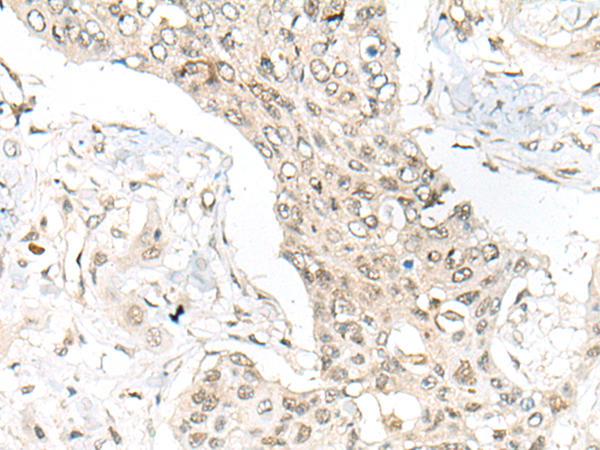
| WB | 咨询技术 | Human,Mouse,Rat |
| IF | 咨询技术 | Human,Mouse,Rat |
| IHC | 1/20-1/100 | Human,Mouse,Rat |
| ICC | 技术咨询 | Human,Mouse,Rat |
| FCM | 咨询技术 | Human,Mouse,Rat |
| Elisa | 1/5000-1/10000 | Human,Mouse,Rat |
| Aliases | MDS; BOPS |
| Host/Isotype | Rabbit IgG |
| Antibody Type | Primary antibody |
| Storage | Store at 4°C short term. Aliquot and store at -20°C long term. Avoid freeze/thaw cycles. |
| Species Reactivity | Human, Mouse |
| Immunogen | Synthetic peptide of human ASXL1 |
| Formulation | Purified antibody in PBS with 0.05% sodium azide and 50% glycerol. |
+ +
以下是3篇关于ASXL1抗体的相关文献概览:
---
1. **文献名称**:*ASXL1 mutations promote myeloid transformation through loss of PRC2-mediated gene repression*
**作者**:Abdel-Wahab O, et al.
**摘要**:该研究利用ASXL1特异性抗体进行染色质免疫沉淀(ChIP)和Western blot分析,发现ASXL1突变通过破坏PRC2复合体的功能,导致靶基因去抑制,促进骨髓恶性肿瘤的发生。
---
2. **文献名称**:*Clinical and biological implications of ASXL1 mutations in cancer*
**作者**:Boultwood J, et al.
**摘要**:文章总结了ASXL1突变在骨髓增生异常综合征(MDS)和白血病中的临床意义,通过免疫组织化学(IHC)和流式细胞术结合ASXL1抗体,揭示了突变与患者预后不良的相关性。
---
3. **文献名称**:*Detection of ASXL1 mutations by immunohistochemistry in hematologic malignancies*
**作者**:Inoue D, et al.
**摘要**:研究开发了一种针对ASXL1截短突变蛋白的特异性抗体,验证其在石蜡切片中的敏感性,为临床快速筛查ASXL1突变提供了一种低成本检测方法。
---
4. **文献名称**:*Loss of ASXL1 leads to myeloid proliferation in a conditional knockout mouse model*
**作者**:Wang J, et al.
**摘要**:通过ASXL1抗体进行蛋白表达分析,发现ASXL1缺失导致小鼠造血干细胞异常增殖,并伴随H3K27me3表观修饰改变,提示其通过表观遗传机制调控造血稳态。
---
以上文献均涉及ASXL1抗体在基础机制研究或临床诊断中的应用,涵盖蛋白质功能分析、突变检测及疾病关联性探索。
The ASXL1 (Additional Sex Combs-Like 1) antibody is a tool used to study the ASXL1 protein, a critical epigenetic regulator involved in chromatin modification and transcriptional regulation. ASXL1. part of the ASXL family (ASXL1-3), interacts with the BAP1 deubiquitinase complex to modulate histone H2AK119 ubiquitination, influencing gene expression patterns. It plays essential roles in hematopoiesis, stem cell maintenance, and cellular differentiation.
Mutations in the ASXL1 gene are recurrently observed in myeloid malignancies, including myelodysplastic syndromes (MDS), acute myeloid leukemia (AML), and chronic myelomonocytic leukemia (CMML), often correlating with poor prognosis. These mutations frequently lead to truncated proteins that disrupt normal epigenetic regulation, promoting leukemogenesis.
ASXL1 antibodies are widely employed in research to detect protein expression, localization, and interaction partners via techniques like Western blotting, immunohistochemistry (IHC), and immunoprecipitation (IP). They aid in identifying ASXL1 loss or aberrant isoforms in patient samples, supporting diagnostic and mechanistic studies. Additionally, ASXL1 antibodies contribute to exploring its tumor-suppressive or oncogenic roles in different contexts, as well as its interplay with other epigenetic modifiers.
Despite challenges in specificity due to shared epitopes among ASXL family members, validated antibodies remain crucial for unraveling ASXL1's role in disease and normal physiology, with potential implications for targeted therapies.
×